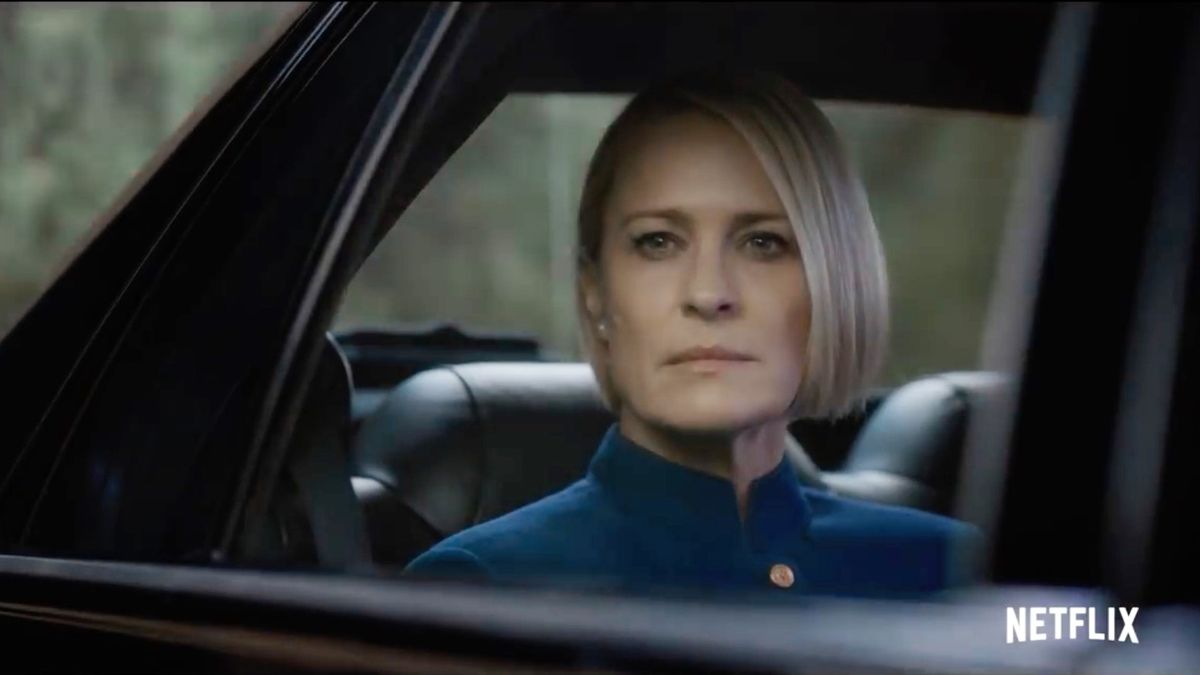Released in February 2013, House of Cards was Netflix’s first original series, and by making all episodes available at once it marked the beginning of the binge TV era. From the moment where Frank Underwood (Kevin Spacey) broke the fourth wall to wring a dog’s neck less than a minute in, it had you hooked on the bargaining and backstabbing of the Capitol.
Its final season finds President Claire Underwood (Robin Wright) weeks after Frank’s death but still finding traces of him everywhere, from the funeral photographs she must approve to his ring which inexplicably turns up on his old bed. The result of this brings a haunted quality to the Oval office and instead of the show truly moving on we see Frank continually pulling the strings from beyond the grave.
Spacey’s Underwood was the dark heart of the series, making it impossible to scrub his bloodstained fingerprints from it entirely. As show-runner Frank Pugliese said: "It seems a little disingenuous to erase him".
So House of Cards leans into this problem, with plot-lines around the murky circumstances of his death and the contents of his will keeping him in the frame. There's loaded asides too like Claire turning to the audience to ask: “Do you miss Francis?” or Doug asking her, “Are you trying to erase him. Because you can’t.” The show’s attempts to reckon with his legacy is an interesting mirroring of reality where we are questioning how to handle the men exposed by the #MeToo movement.
Much has been made of how - and if - the show should continue without Spacey, whose career appears over after facing multiple accusations of sexual misconduct. In reality where it falters is not by losing Frank Underwood, but in failing to find anything compelling enough to replace him.
The season hones in on new characters Bill Shepherd (Greg Kinnear) and his sister Annette (Diane Lane), two siblings inspired by the Koch brothers who inherited an industrial conglomerate and use their money to buy political influence. The pair challenge Claire’s grip on power and add some vigour to the season where some of the longstanding characters feel as though they are standing around waiting for their turn to be murdered.
Doug Stamper (Michael Kelly), who has long been one of the show’s most compelling characters, feels sold short by his constantly changing allegiance and the show misses an opportunity to give him a redemptive ending.
For five seasons Stamper and the Underwoods have eliminated anyone who knows too much, but when the truth feels it will finally out it’s hard to keep track of all of the crimes committed, let alone feel emotionally invested in them coming to light.
The show also suffers the consequence of being upstaged by the stranger than fiction developments of real life politics and technology. In the post-Trump political landscape you get the sense that House of Cards has been mimicking news cycles rather than predicting them and this series is filled with old news from Russian troll farms to data breaches on apps.
Where the series is most interesting is in exploring the reality the first female president would have to face. Claire receives four times as many threats as her male predecessors with one wanting to rearrange her body parts into the American flag, "flesh for the white stripes, blood for the red".
We see her being held to bargains Frank struck and fighting to be treated with half the respect of her dead husband. In a time where the alternative reality in which America got its first female president has been romanticised by many, it’s a sobering reminder of how difficult Hillary would have had it. A female president wouldn’t have cured misogyny but revealed it was everywhere.
“She’s weaponising her feminism,” Annette rages at one point in response to Claire’s appointing of an all-female cabinet, reverting to his maiden name and playing on America's worst fears of a female president by putting on a bout of emotional hysteria.
Claire’s ratings rise as she manipulates the hunger for messages of female empowerment and it’s easy to see how in a post #MeToo world this kind of cynical campaign might wash. This might work as a storyline in isolation were it free from the weight of tying to simultaneously move on from Frank and close the book on the world created around him.
Instead the season falls short and concludes with so many unanswered questions it feels the writers couldn't face trying to wrap up storylines that have been expanding for years. In the final episode Claire talks of Frank's hunger for power saying in the end "he ate himself". It's hard not to feel the same fate has befallen House of Cards.














